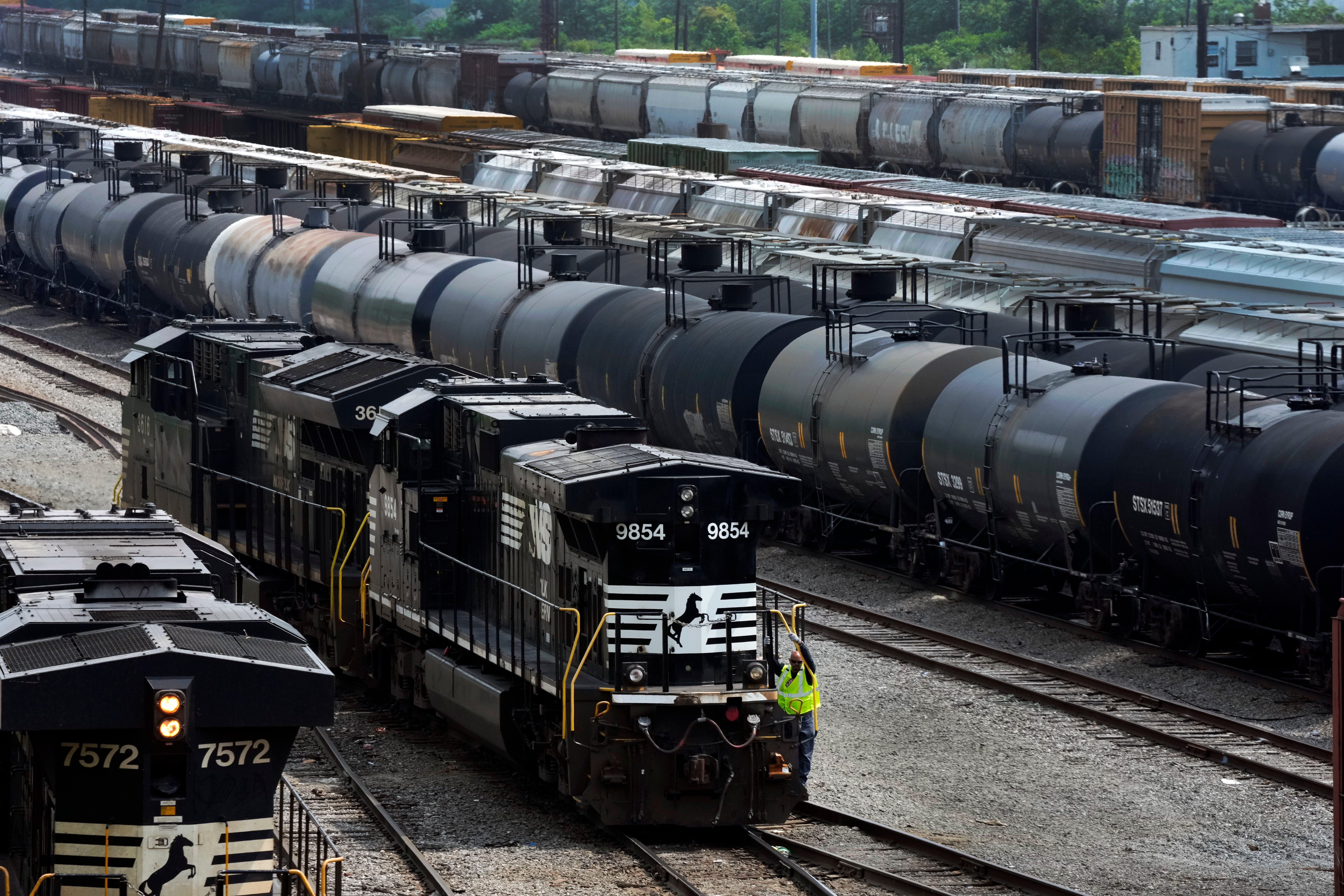LOCALIZE IT: States take harder look at rail safety after fiery derailment of hazardous shipment

EDITORS/NEWS DIRECTORS:
February’s fiery train derailment that forced evacuations in Ohio has spurred the federal government and some states to consider toughening safety standards amid questions about railroad safety and hazardous materials shipments
Fifty cars on a Norfolk Southern train, including 10 carrying hazardous materials, derailed near the town of East Palestine in eastern Ohio.
Firefighters who responded to it Ohio struggled to immediately identify the hazardous chemicals the train was hauling due to a lack of communication from the railroad, officials said last week, while a union official said freight railcar inspections are happening less often and are not as thorough.
Concerns about whether five of those cars containing vinyl chloride could explode prompted officials to evacuate half the town and a surrounding rural area. Crews released the toxic chemical and burned it, while residents waited to return to their homes.
Hazardous materials shipments account for 7-8% of the roughly 30 million shipments railroads deliver across the U.S. each year.
The Association of American Railroads trade group says 99.9% of those hazardous materials shipments reach their destinations safely. But even one derailment involving hazardous materials could be disastrous, especially if it happened in a populated area.
___
READ AP’S LATEST
States clamp down on freight trains, fearing derailments and federal gridlock
___
STATES WITH LAWS OR VOTES ON RAIL SAFETY
At least a dozen states have either passed laws or held at least one vote on railroad safety legislation.
These states have passed laws:
— Ohio
— Minnesota
— Utah
Lawmakers in these states have held at least one vote on a bill:
— Arizona
— Iowa
— Kansas
— Maryland
— Michigan
— New York
— Pennsylvania
— Washington
Nevada’s governor vetoed legislation that went to his desk.
Kansas’ governor has proposed a new regulation.
___
RESOURCES ON POTENTIAL FEDERAL LEGISLATION AND THE EAST PALESTINE DERAILMENT
— Bipartisan legislation has been introduced in both chambers of Congress. A Senate bill passed committee, but it has not emerged for a floor vote. Meanwhile, bipartisan House bills aimed at rail safety have so far failed to gain momentum in the Republican-controlled House.
— The National Transportation Safety Board has yet to issue a final report in the East Palestine derailment, but it said in its preliminary report that an overheating wheel bearing likely caused the accident and it has released documents listed here in its docket as part of its investigation.
___
FIND LOCAL DATA ON RAILROAD ACCIDENTS, DERAILMENTS AND TRAFFIC
— The Federal Railroad Administration tracks railroad accidents and derailments. Here is an overview of the recent accident trends by different causes. The data can be sorted by state to find local statistics. The FRA also maintains a database where you can look up accident data and find reports on specific instances in your area.
— The Pipeline and Hazardous Materials Safety Administration has a database of information about hazardous materials incidents. The site includes data on incidents from 2013 to 2022, and it can be broken down by the mode of transportation. It also includes details about injuries and evacuations.
— The Association of American Railroads trade group reports railroad traffic data on a weekly basis. The numbers are broken down into the major shipping categories of: chemical, coal, farm products, forest products, grain, metallic ores and metals, motor vehicles and parts, nonmetallic minerals, petroleum and petroleum products, intermodal shipping containers and other.
___
TAKE YOUR REPORTING FURTHER
— Last week’s NTSB hearings on the East Palestine derailment were streamed live. Here is Day 1 and here is Day 2. Also, here is a media briefing that NTSB conducted at the hearings.
— Contact your state emergency response agency to ask about the precautions that are taken to keep hazardous materials shipments safe, and whether they know what hazardous materials are being shipped. Ask about how railroads route hazardous materials shipments on the safest possible paths.
— Contact your local fire department to ask about how first responders are trained to respond to a railroad accident.
— Ask what first responders do to prepare for hazardous materials accidents.
— Railroads cross through nearly every city and town across the country. If you have significant railroad operations in your city, contact local railroad unions and ask workers whether inspections are happening less often — and why.
___
PUBLISH THIS BACKGROUND
The worst railroad disaster in recent history happened in 2013 when the brakes failed on a train in the hills above the Canadian town of Lac Megantic. The train rolled downhill into the town and derailed, killing 47 people and causing millions of dollars in damage.
A 2005 derailment in Graniteville, South Carolina, killed nine people and injured more than 250 when toxic chlorine gases were released.
Another fiery derailment happened just outside the town of Casselton, North Dakota, in 2013 after a crude oil train collided with several cars from a grain train that had derailed.
Concerns about hazardous materials shipments grew more than a decade ago after the number of crude oil shipments railroad hauled surged as domestic energy production grew.
The railroad industry has made a number of major operational changes and eliminated roughly one-third of its jobs over the past six years. Railroads now rely on fewer, longer trains, so they say they don’t need as many crews, mechanics and locomotives. Rail unions say the changes have made railroads riskier because workers are spread more thin, but the industry has defended its safety record.
___
READ OTHER AP COVERAGE
EPA chief at train derailment site: ‘Trust the government’
Upset Ohio town residents seek answers over train derailment
Ohio derailment aftermath: How worried should people be?
Fiery Ohio derailment raises railroad safety questions
___
Localize It is an occasional feature produced by The Associated Press for its customers’ use. Questions can be directed to Katie Oyan at koyan@ap.org.
Bookmark popover
Removed from bookmarks